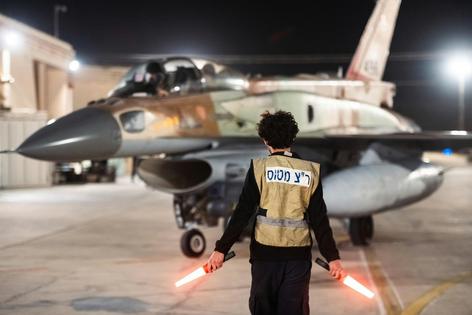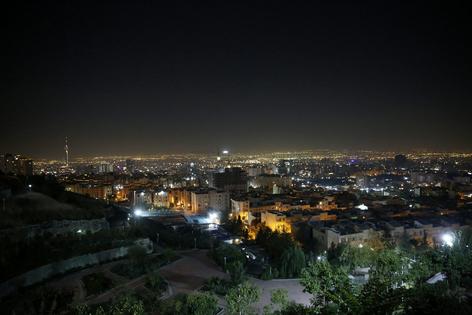Israel’s latest strike against Iran may actually de-escalate regional tensions – for now, at least
Published in Political News
Israel’s airstrikes of Oct. 26, 2024 – which hit around 20 military targets in Iran, Iraq and Syria – had been anticipated for weeks. Indeed, the operation followed a promise from Israeli Prime Minister Benjamin Netanyahu to retaliate for an earlier ballistic missile attack by Tehran in early October.
The move also follows a pattern that has seen Iran and Israel take turns to up the ante in what was for a long time a “shadow war,” but which has has now developed into direct confrontation.
These tit-for-tat attacks prompted widespread fears that the whole region was poised to enter a more escalatory phase.
But, counterintuitive though it may seem, I believe that the latest Israeli strikes may actually have defused tensions. To understand why, it is worth analyzing the nature and scale of the Israeli operation, as well as the likely stance of decision-makers in Israel, Iran and the United States in the aftermath of the attack.
The October air assault by Iran was itself retaliation for a series of Israeli operations against Iran’s proxy group Hezbollah. These included the assassination of a high-ranking Hamas official in Tehran on the eve of the inauguration of Iran’s new president in July and the killing of Hezbollah’s leader in late September.
Similarly, an earlier air assault on Israeli targets in April by Tehran was in response to Israeli provocations this spring – including a strike against the Iranian consulate in Damascus, Syria, on April 1 that killed two senior military officers.
Many observers anticipated, or feared, an Israeli response to Iran’s October missile and drone attack to be heavy, and punishing – Israel certainly has the military capability to do so.
But rather than target vital infrastructure in Iran or the country’s nuclear facilities, Israel instead opted for “precise and targeted” strikes on the Islamic Republic’s air defense and missile capabilities.
The somewhat limited scope of the Israeli operations suggests that the strike was designed to send a strong message to Iran’s supreme leader and Iranian military commanders. In essence, Israel was signaling that it has the capability to strike at the heart of Iran, while holding back from a full-throttled attack that would have had further damaged Iran’s fragile economy.
While it will take time for a full assessment of the effectiveness of Israel’s strikes to emerge, early indications suggest that they succeeded in revealing weaknesses in Iran’s overall security. These weaknesses that could be further exploited against other more important targets, such as oil and gas production facilities or even nuclear power sites, should Iran or its partners in the so-called “axis of resistance” choose to retaliate.
Despite the apparent success of Israel’s attacks against a wide range of targets, statements from Iranian leaders suggest the operational impact was limited. An Iranian Foreign Ministry statement condemned the attack, noting that Iran “had a right to self defense.” But at the same it added that Iran would “uphold its commitments for regional peace and stability.”
Reading into those words, it suggests to me that Iran is not immediately seeking to retaliate and escalate tensions further.
Of course, that could change. Further messages by Iranian Supreme Leader Ali Khameini or Quds Force commander Esmail Qaani may give a clearer indication whether Iran will seek to retaliate, and how.
But with Iran well-aware of the impact that escalation – and the potential for more U.S.-led sanctions and heightened support for Israel – would have on its ailing economy, it may well calculate that a return to the pre-escalation status quo with Israel is in its interests.
A return to the shadow war between Israel and Iran – as opposed to open warfare – would no doubt be welcomed in Washington.
Since the horrific Hamas attacks in Israel on Oct. 7, 2023, the Biden administration has been caught between competing obligations and concerns. This has included supporting longstanding ally Israel, while not alienating friendly Arab governments and trying to avoid conflict creep into all out war in the region.
Meanwhile, in an election year, the Democratic ticket in particular is trying to balance its support for a largely pro-Israel Jewish voting block with a need not to offend potentially important Muslim votes in key states, nor a more pro-Palestinian youth vote.
Escalation of conflict in the region does nothing to help the White House in these respects. Yet President Joe Biden’s decades-long relationship with Netanyahu has not led to outcomes that the administration has sought. Washington has not succeeded in pushing its ally toward a ceasefire in Gaza, nor a cessation of hostilities between Hezbollah and Israel in southern Lebanon.
And with the U.S. election looming on Nov. 5, elevated tensions in the Middle East on various fronts could impact how voters perceive Vice President Kamala Harris or former President Donald Trump — especially in the battleground state of Michigan, where the Democratic ticket may lose votes among Arab and Muslim Americans angered over the Biden administration’s perceived pro-Israel stance.
Predicting what will happen next in the Middle East has escaped the most seasoned analysts.
It may take days, weeks or even months to assess whether this latest airstrike by Israel will lead to a further escalation of tensions between Iran and Israel – or whether a more de-escalatory dynamic settles over the region.
But there are good reasons to believe that decision-makers in Iran, Israel and the U.S. know that more escalation is in no one’s interests. And the latest salvo may have just done enough to satisfy Israel, while providing cover for Tehran to say that there is no need to return fire in kind.
This article is republished from The Conversation, a nonprofit, independent news organization bringing you facts and trustworthy analysis to help you make sense of our complex world. It was written by: Javed Ali, University of Michigan
Read more:
Commander of Iran’s elite Quds Force is expanding predecessor’s vision of chaos in the Middle East
Israel’s ‘generals’ plan’ to clear Palestinians from north of Gaza could pave the way for settlers to return
Hamas at a crossroads: Sinwar’s death leaves a vacuum; Israeli actions make it harder to fill with a moderate
Javed Ali does not work for, consult, own shares in or receive funding from any company or organization that would benefit from this article, and has disclosed no relevant affiliations beyond their academic appointment.
































































Comments